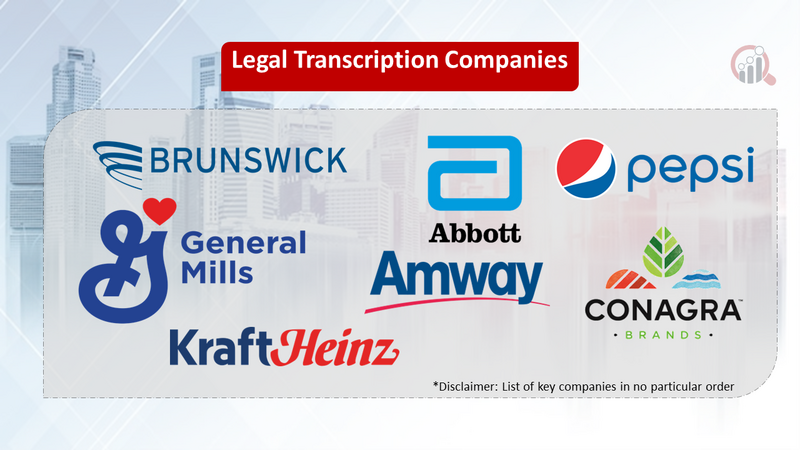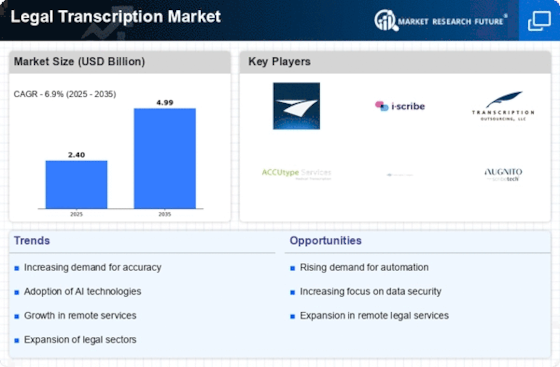Top Industry Leaders in the Legal Transcription Market

Competitive Landscape of Legal Transcription Market: A Deep Dive
The legal transcription market, valued at [insert latest market size estimate], is experiencing robust growth driven by increasing litigation activities, complex legal proceedings, and the need for accurate and efficient documentation. This burgeoning market attracts an array of players, each vying for a larger slice of the pie. Here's a comprehensive analysis of the competitive landscape, key players, and their strategies:
Key Players:
-
General Mills Inc.
-
Amway
-
Conagra Brands Inc.
-
Cargill Incorporated
-
Abbott Laboratories
-
Kraft Foods Group Inc.
-
The Coca-Cola Company
-
PepsiCo Inc.
-
Atkins Nutritionals Inc.
-
Brunswick Corporation
Strategies Adopted:
-
Technology Integration: Leading players are heavily investing in AI and machine learning for improved accuracy, speed, and scalability. This includes automatic speaker identification, dialect recognition, and legal term identification.
-
Competitive Pricing: Price wars are prevalent, with players offering discounts, subscription models, and tiered pricing structures to attract cost-conscious clients.
-
Data Security and Privacy: Legal transcriptions often involve sensitive information. Secure data storage, encryption protocols, and adherence to data privacy regulations are crucial for building client trust.
-
Global Expansion: Established players are expanding their reach to new markets, while regional players are partnering with international firms to tap into untapped potential.
-
Specialized Services: Niche offerings like multilingual transcription, expedited delivery, and real-time transcription cater to specific client needs and provide a competitive edge.
Factors for Market Share Analysis:
-
Revenue: A key indicator of a company's financial health and market penetration.
-
Client Base: The number and type of clients served, including law firms, government agencies, and individual lawyers.
-
Geographical Reach: Presence across different countries and regions.
-
Technology Adoption: Level of integration of AI, machine learning, and other advanced technologies.
-
Customer Satisfaction: Client reviews, testimonials, and repeat business rates.
-
Brand Recognition: Brand reputation and industry standing.
New and Emerging Companies:
-
AI-powered Startups: Ava Legal, Vocalis, and Voicedoc. These startups offer specialized AI-powered solutions for legal transcription, such as automatic legal document summarization and sentiment analysis.
-
Cloud-based Platforms: TranscribeMe and Scribie. These platforms provide cloud-based transcription services, offering flexibility and scalability to clients.
-
Freelance Marketplaces: Upwork and Fiverr. These platforms connect legal professionals with freelance transcriptionists, offering a cost-effective option for smaller projects.
Current Company Investment Trends:
-
Acquisitions and Mergers: established companies are acquiring smaller players with niche expertise or technological capabilities to expand their service offerings and market reach.
-
Venture Capital Funding: AI-powered startups are attracting significant VC funding to fuel their technology development and market expansion.
-
Strategic Partnerships: Collaboration between legal transcription providers and legal software companies is on the rise, creating integrated solutions for legal professionals.
The Road Ahead:
The legal transcription market is poised for continued growth, driven by increasing legal complexity, technological advancements, and the growing demand for accurate and efficient documentation. Players who adapt to these trends, embrace technology, and cater to the specific needs of their clientele will be well-positioned to thrive in this competitive landscape.
Latest Company Updates:
February 2023- For the first time, the Supreme Court started providing real-time written transcripts of its proceedings in February using Artificial Intelligence (AI) technology. The live transcription was initiated on a trial basis in Chief Justice of India DY Chandrachud's courtroom, who was leading a constitutional bench hearing a case pertaining to the constitutional crisis in Maharashtra. The Supreme Court will publish the transcripts of the oral arguments on its website and provide them to the lawyers involved. This paraphrasing retains the original meaning while rewording the text.

